Konsep Empowerment Sebagai Instrumen Pembangunan Ekonomi Islam (Telaah Kritis Pemikiran Ibnu Khaldun dan Umer Chapra)
Abstract
The main problem of economic development such as poverty, unemployment, asymmetry of economic among individuals could not be removed succecfully in Indonesia. One of the reasons is caused with unreadable other variables such as social law, politics, culture and so on. The size of the success Islamic economic growth is not measured only from the material achievement perspective or the results of quantity, but also from the improving religious perspective, social and society life. The motodology of this research is library research. To get more information, the reference is taken from some book that have relation with the topic. The result is that Ibn Khaldun’s thought is referring to the term "umran al-alam" or prospering the world. It is formed from three components, namely; history (tarikh), cooperation among society (al-ijtima 'al-insani) and the universe (al-kawn). Ibnu Khaldun offered the concept of Islamic economic development: First, the contribution of humans (ar-Rijal). Second, the contribution of development (al-Imarah), Third, the contribution of institutions and government. Fourth, the contribution of wealth (al-mal). Umer Chapra believed that the means of quittable development requires "efficiency" and "equalization" of the use of all resources, both "efficiency" and "justice" cannot be applied or actualized without the supporting with moral dimensions in economic activities. Umer Chapra's thoughts are following: First, Efficiency, justice and morality. Second, the contributions of the state. Two thoughts on Islamic economic development below are known that the concept of Islamic economic development does not only measure the level of welfare in the world, but also the more important is how to prosper in the hereafter. The built concept of the two thinkers is directed more to the concept of empowerment or empowering natural resources efficiently and equitably by the role upholding ethical values and social justice.
References
Al Mizan. (2016). Pembangunan Ekonomi Dalam Perspektif Ekonomi Islam. Maqdis: Jurnal Kajian Ekonomi Islam, 01(02).
Anwas, O. M. (2014). Pemberdayaan Masyarakat Di Era Global. Bandung: Alfabeta.
Aryanti, Y. (2018). Pemikiran Ekonomi Ibn Khaldun Pendekatan Dinamika Sosial Ekonomi dan Politik. Imara: Jurnal Riset Ekonomi Islam, 2. https://doi.org/10.31958/imara.v2i2.1256
Athoillah, M. A., & Q-Anees, B. (2013). Filsafat Ekonomi Islam. Bandung: Sahifa.
Aziz, Moh. Ali, Suhartini, R., & Halim, A. (2005). Dakwah Pemberdayaan Masyarakat: Paradigma Aksi Metodologi. Yogyakarta: Pustaka Pesantren atas kerjasama dengan Dakwah Press, Fakultas Dakwah, IAIN Sunan Ampel Surabaya.
Beik, I. S. (2016). Ekonomi Pembangunan Syariah. Jakarta: Rajagrafindo Persada.
Bungin, B. (2001). Metodologi Penelitian Sosial: Format Kuantitatif dan Kualitatif. Surabaya: Airlangga University Press.
Chapra, M. Umar. (1993). Islam and Economic Development. Islamabad: Islamic Reseach Institute Press.
Chapra, M Umar. (2007). Islam and Economic Development. Jeddah: Islamic Research and Training Institute (IRTI) Islamic Development Bank.
Chapra, M. Umar. (2008). Ibnu Khaldun’s Theory of Development: Does It Help Explain the Low Performance Present-Day Muslim World? The Journal of Socio-Economics, 37(02).
Chapra, M Umer. (1992). Islam and the Economic Challenge. Riyadh: International Islamic Publishing House.
Esposito, John. L. (2001). Ensiklopedia Oxford: Dunia Islam Modern. Bandung: Mizan.
Graha, A. N. (2009). Pengembangan Masyarakat Pembangunan Melalui Pendampingan Sosial dalam Konsep Pemberdayaan di Bidang Ekonomi. Jurnal Ekonomi Modernisasi, 05(02).
Hidayatullah, I. (2017). Pemikiran Ibnu Khaldun Tentang Mekanisme Pasar & Penetapan Harga. Profit : Jurnal Kajian Ekonomi Dan Perbankan Syariah, 1(1). Diambil dari https://ejournal.unuja.ac.id/index.php/profit/article/view/318
Huda, C. (2013). Pemikiran Ekonomi Bapak Ekonomi Islam: Ibnu Khaldun. Economica: Jurnal Ekonomi Islam, 04(01).
Hutomo, M. Y. (2000). Pemberdayaan Masyarkat dalam Bidang Ekonomi: Tinjauan Teoritik dan Implementasi. Jakarta: Bappenas.
Ibnu Khaldun. (2000). Muqaddimah, terj. Ahmadie Thoha. Jakarta: Pustaka Firdaus.
Jirhanuddin, J. (2016). Konsep Pengelolaan Pajak yang Adil Perspektif Ibnu Khaldun. Jurnal Al-Qardh, 1(2). Diambil dari http://e-journal.iain-palangkaraya.ac.id/index.php/qardh/article/view/631
Khan, M. A. (1997). Ajaran Nabi Muhammad SAW tentang Ekonomi (Kumpulan Hadits-Hadits Pilihan Tentang Ekonomi). Jakarta: PT. Bank Muamalat Indonesia.
Khurshid, A. (1976). Economic Development in an Islamic Framework, Studies Islamic Economics. King Abdul Aziz University.
Khursid, A. (1980). Studies in Islamic Economics. International Journal of Middle East Studies, 17(2), 413.
Khursid, A. (1997). Pembangunan Ekonomi dalam Perspektif Islam, dalam Etika Ekonomi Politik. Jakarta: Risalah Gusti.
Martono, T. (2008). Ekonomi Pembangunan. Surakarta: UNS Press.
Mohammad, M. T. S. H. (2010). Principles of Sustainable Development in Ibn Khaldun’s Economic Thought. Malaysian Journal of Real Estate, 05(01).
Moloeng, L. J. (1999). Metode Penelitian Kualitatif. Bandung: PT Remaja Rosdakarya.
Mth, A. (2003). Konsep Pembangunan Ekonomi Islam. Al-Mawarid Journal of Islamic Law, 10. Diambil dari https://www.neliti.com/id/publications/42590/konsep-pembangunan-ekonomi-islam
Rachman, B. M. (2011). Ensiklopedi Nurcholish Madjid: Pemikiran Islam di Kanvas Peradaban. Jakarta: Democracy Project Yayasan Abad Demokrasi.
Saputra, B. A. (2016). Pemikiran Pembangunan Ekonomi Islam Menurut Pemikiran M. Umer Chapra. UIN Sunan Kalijaga.
Suharto, U. (2012). Ilmu Ekonomi Islam Sebagai Persepaduan Ilmu Ekonomi Dan Ilmu-Ilmu Agama Islam: Satu Pengamatan Ringkas (Islamic Economics as An Integration between Economics and Islamic Studies: A Brief Observation). In Mohd Zaidi Ismail and Wan Suhaimi Wan Abdullah (Eds.) Adab dan Peradaban. Malaysia: MPH Publishing.
Tohir, M. (2014). Rekonstruksi Pemikiran Pembangunan Ekonomi Islam menurut Pemikiran Al-Ghazali, Ibn Khaldun dan M. Umer Chapra (Skripsi). UIN Sunan Kalijaga, Yogyakarta.
Yahya, M. H. (2011). Umran Al ‘Alam Dari Perspektif Ibn Khaldun: Suatu Anjakan Paradigma. International Journal of West Asian Studies, 03(01).








